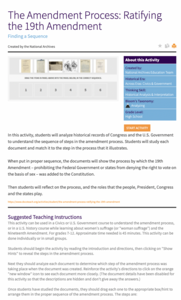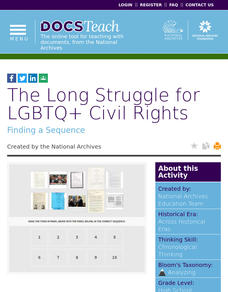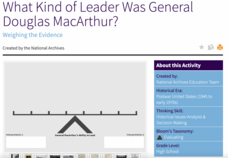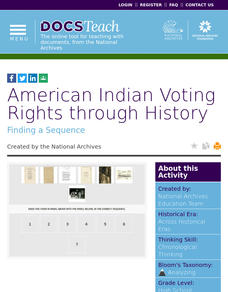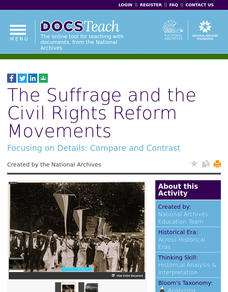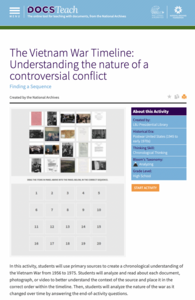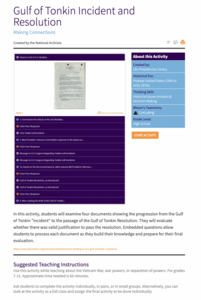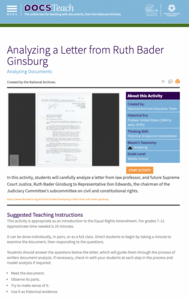DocsTeach
African American Soldiers and Civil Rights During WWI
Young scholars analyze primary source documents and images to determine how African American soldiers were denied their civil rights during World War I.
DocsTeach
School Desegregation Court Cases: Mendez v. Westminster and Brown v. Board
Separate is not equal! Young historians analyze the petition from the U.S. Supreme Court case Mendez v. Westminster filed in 1945 and examine background material about the case. They then compare it to the more famous Brown v. Board of...
DocsTeach
The Amendment Process: Ratifying the 19th Amendment
The process for adding an amendment to the U.S. Constitution is long and arduous, by design. High School historians study a series of documents about the Nineteenth Amendment and, using an interactive program, drag the documents onto a...
DocsTeach
The Long Struggle for LGBTQ+ Civil Rights
Academics analyze 10 primary documents and photos to create a timeline of the LQBTQ+ movement. The activity includes an online worksheet. Scholars also participate in a group discussion to understand the long struggle the LGBTQ+...
DocsTeach
The 19th Amendment and the Road to Universal Suffrage
Your vote matters! An informative activity focuses on the Nineteenth Amendment and explains how it paved the way for universal voting rights. Young historians analyze several documents and a complete a worksheet, describing the impact of...
DocsTeach
How Have Americans Responded to Immigration?
While America says it welcomes from other countries the tired and poor yearning to be free, the record is mixed on whether there has been a warm reception for immigrants. Class members use an interactive graphic scale and primary source...
DocsTeach
What Kind of Leader Was General Douglas MacArthur?
For five decades, General Douglas MacArthur shaped US military involvement around the world. His career ended when he went toe to toe with President Dwight Eisenhower over the Korean War. Young historians evaluate the complicated command...
DocsTeach
American Indian Voting Rights through History
Vote ... it's your right! An enlightening lesson examines the history of voting rights for Native Americans. Leaners analyze primary documents and place them in chronological order. Academics also create a list of other events that took...
DocsTeach
The Suffrage and the Civil Rights Reform Movements
It's the American way to put one foot in front of the other and march. Using images of protests from the civil rights and women's suffrage movements, young historians analyze similarities between the two watershed moments of social...
DocsTeach
Ernest Hemingway: Life and Works
An interactive activity asks scholars to match the title of an Ernest Hemingway novel with one of seven photographs.
DocsTeach
The Space Race: Project Mercury
Race to the moon! An engaging activity focuses on NASA's Project Mercury and the Space Race. Scholars read a memorandum regarding the project and explore how it fueled Cold War tensions. Academics complete a worksheet and discuss the...
DocsTeach
The Path of Justice: Selma and the Voting Rights Act
The civil rights movement: An ongoing battle for change. The activity focuses on President Johnson's speech in response to the massacre at the Selma March. Academics study the speech, complete a hands-on-activity, and discuss President...
DocsTeach
The Impact of Bloody Sunday in Selma
Who is to blame when a peaceful protest turns deadly? Scholars research the impact of the civil rights march in Selma, better known as Bloody Sunday. The activity uses files from the FBI's investigation to help academics understand the...
DocsTeach
The Civil Rights Act of 1964 and the Equal Employment Opportunity Commission
1964: A victory for the civil rights movement! Scholars read a section of the Civil Rights Act of 1964 and discuss what affirmative actions means to them. The resource is a jigsaw activity, with each group focusing on one section of the...
DocsTeach
Responding to the Murder of Harry T. Moore
Heroic civil rights leader Harry T. Moore is murdered! An eye-opening activity delves into the past to understand the murder of prominent civil rights leader and educator Harry Moore and his wife. Academics also read President Truman's...
DocsTeach
The Vietnam War Timeline: Understanding the Nature of a Controversial Conflict
The story of the Vietnam War is often told through images. Young historians analyze images and primary sources —including the Vietnamese Army's Seven Commandments poster and photos of the daily life of soldiers—to construct a timeline of...
DocsTeach
The War in Vietnam - A Story in Photographs
The Vietnam War was the first war to come into American living rooms with its images of American soldiers fighting in jungles far, far away. Young historians analyze and curate photos from the conflict, deciding how they would create a...
DocsTeach
Introduction to the Domino Theory and Containment Policy in Vietnam
Scholars analyze a propaganda poster against communism. The resource uses the poster to examine the domino theory and containment policies used by the United States to stop the spread of communism in Vietnam. Scholars work in pairs or...
DocsTeach
Gulf of Tonkin Incident and Resolution
They sunk our battleship! An engaging activity focuses on the Gulf of Tonkin Incident and the sinking of the USS Maddox. Young historians learn how it increased tensions leading to the Vietnam War and read through a first draft of the...
DocsTeach
Cultural Diplomacy and the Smith-Mundt Act
During the Cold War, the United States used everything from bookmobiles to radio stations to improve its image globally. Using documents from the programs, including photographs and official memos, individuals consider how the United...
DocsTeach
Cultural Diplomacy and Propaganda During the Cold War
There's a fine line between diplomacy and propaganda. Young historians consider that boundary by examining documents from the Cold War, including memorandum about the lunar program and Peace Corps in addition to a propaganda film. Using...
DocsTeach
Civil Rights or Freedom? When Vietnam and the Civil Rights Movement Clashed
When Martin Luther King Jr. took a stand against the Vietnam War, interests collided. With a letter from Jackie Robinson to Lyndon B. Johnson, the baseball legend urges the president to remain firm in his resolve for civil rights. Young...
DocsTeach
Analyzing a Letter from Ruth Bader Ginsburg
Before her career as a Supreme Court Justice, the Notorious RBG was a legal activist for women's rights. Using a letter from then-Professor Ginsburg, young historians carefully examine a letter from Ginsburg to a member of Congress...
DocsTeach
Analyzing the Gulf of Tonkin Resolution (Original Draft Resolution)
Breaking news, President Johnson addresses the nation! Scholars watch a video of President Johnson's address to Congress regarding the Gulf of Tonkin Resolution. The activity focuses on the motivation behind the resolution and the...




